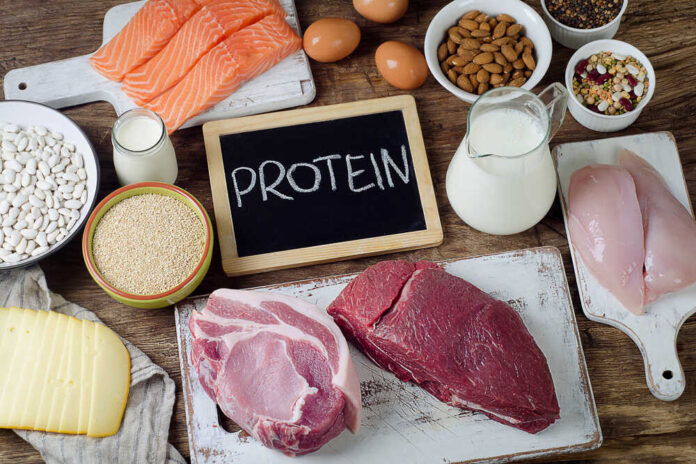
Protein plays a crucial role in maintaining our bodies’ structure, function, and overall health. It is a building block for muscles, bones, skin, hair, and nails, and it helps our bodies repair tissues and produce essential enzymes and hormones.
In short, without enough protein, our bodies cannot function optimally.
Daily Protein Requirements for Women
There isn’t a one-size-fits-all answer to how much protein women need in a day. The optimal amount varies depending on factors such as age, activity level, and individual health needs.
The Recommended Dietary Allowance (RDA) for protein is calculated as 0.8 grams of protein per kilogram of body weight, per day.
For example:
If you weigh 120 pounds, that equates to 54.4 kilograms.
54.4 x 0.8 = 43.5
Therefore, a 120 lb woman would need at least—at minimum—43.5 grams of protein per day.
If you weigh 200 pounds, that equates to 90.7 kilograms.
90.7 x 0.8 = 72.6
So a 200 lb woman needs at least 72.6 grams of protein per day.
However, this number is only a baseline and might not be sufficient for those who lead an active lifestyle or have specific health needs.
Active Women and Athletes
Active women and athletes typically require more protein than sedentary individuals to support muscle growth, repair, and recovery. Endurance and strength-training athletes may need to consume between 1.2 and 1.7 grams of protein per kilogram of body weight daily.
Pregnant and Breastfeeding Women
Pregnancy and breastfeeding demand higher protein intake to support the growth and development of the baby, as well as the mother’s increased physiological needs. Health guidelines generally recommend an additional 25 grams of protein per day for pregnant and breastfeeding women.
Older Women
As we get older, our bodies generally become less efficient at utilizing protein, leading to a higher risk of muscle loss, known as sarcopenia. To prevent this, older women should consume approximately 1.0 to 1.2 grams of protein per kilogram of body weight daily.
The Big Misconception About Protein
Concerns about protein are commonly raised in conversations about vegetarianism, veganism, and plant-based diets.
This comes from the common misconception that protein can only be obtained from animal-based food sources like meat, eggs, and dairy.
Think of it this way: protein is a building block for all living cells—including plant cells. When you eat any plant-based food, you are consuming some protein.
Vegans and vegetarians are not suffering from protein deficiencies. Protein deficiencies are very rare—almost nonexistent—in America. In fact, you are more likely to suffer the consequences of too much protein than too little.
Protein deficiencies pretty much only happen in developing countries and areas where access to food is severely limited.
If you are eating a normal amount of food, you probably don’t need to worry about counting grams of protein.






















